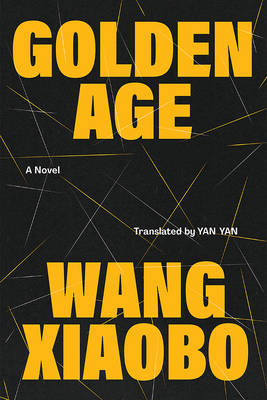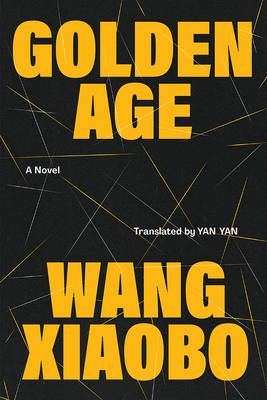
- Afhalen na 1 uur in een winkel met voorraad
- Gratis thuislevering in België vanaf € 30
- Ruim aanbod met 7 miljoen producten
- Afhalen na 1 uur in een winkel met voorraad
- Gratis thuislevering in België vanaf € 30
- Ruim aanbod met 7 miljoen producten
Zoeken
Omschrijving
"Like a Chinese Kurt Vonnegut. By turns lyrical and satirical, Wang Xiaobo's sexual comedies set during the Chinese Cultural Revolution are as improbable as that genre sounds. His long overdue publication in English comes as a gift. Golden Age is funny and brave and profound."
--Chris Kraus, author of I Love Dick "At the time Wang was writing, novels about the Cultural Revolution tended to be fairly conventional tales of how good people suffered nobly during this decade of madness. The system itself was rarely called into question. Wang's book was radically different . . . The idea of how to stand up to power underlies Golden Age."
--Ian Johnson, The New York Times Book Review Like Gary Shteyngart or Michel Houellebecq, Wang Xiaobo is a Chinese literary icon whose satire forces us to reconsider the ironies of history. "Apparently, there was a rumor that Chen Qingyang and I were having an affair. She wanted me to prove our innocence. I said, to prove our innocence, we must prove one of the following:
1. Chen Qingyang is a virgin
2. I was born without a penis.
Both of these propositions were hard to prove; therefore, we couldn't prove our innocence. In fact, I was leaning more toward proving that we weren't innocent." And so begins Wang Er's story of his long affair with Chen Qinyang. Wang Er, a 21-year-old ox herder, is shamed by the local authorities and forced to write a confession for his crimes. Instead, he takes it upon himself to write a modernist literary tract. Later, as a lecturer at a chaotic, newly built university, Wang Er navigates the bureaucratic maze of 1980's China, boldly writing about the Cultural Revolution's impact on his life and those around him. Finally, alone and humbled, Wang Er must come to terms with the banality of his own existence. But what makes this novel both hilarious and important is Xiaobo's use of the awkwardness of sex as a metaphor for all that occured during the Cultural Revolution. This achievement was revolutionary in China and places Golden Age in the great pantheon of novels that argue against governmental control. A leading icon of his generation, Wang Xiaobo's cerebral and sarcastic narrative is a reflection on the failures of individuals and the enormous political, social, and personal changes in twentieth-century China.
--Chris Kraus, author of I Love Dick "At the time Wang was writing, novels about the Cultural Revolution tended to be fairly conventional tales of how good people suffered nobly during this decade of madness. The system itself was rarely called into question. Wang's book was radically different . . . The idea of how to stand up to power underlies Golden Age."
--Ian Johnson, The New York Times Book Review Like Gary Shteyngart or Michel Houellebecq, Wang Xiaobo is a Chinese literary icon whose satire forces us to reconsider the ironies of history. "Apparently, there was a rumor that Chen Qingyang and I were having an affair. She wanted me to prove our innocence. I said, to prove our innocence, we must prove one of the following:
1. Chen Qingyang is a virgin
2. I was born without a penis.
Both of these propositions were hard to prove; therefore, we couldn't prove our innocence. In fact, I was leaning more toward proving that we weren't innocent." And so begins Wang Er's story of his long affair with Chen Qinyang. Wang Er, a 21-year-old ox herder, is shamed by the local authorities and forced to write a confession for his crimes. Instead, he takes it upon himself to write a modernist literary tract. Later, as a lecturer at a chaotic, newly built university, Wang Er navigates the bureaucratic maze of 1980's China, boldly writing about the Cultural Revolution's impact on his life and those around him. Finally, alone and humbled, Wang Er must come to terms with the banality of his own existence. But what makes this novel both hilarious and important is Xiaobo's use of the awkwardness of sex as a metaphor for all that occured during the Cultural Revolution. This achievement was revolutionary in China and places Golden Age in the great pantheon of novels that argue against governmental control. A leading icon of his generation, Wang Xiaobo's cerebral and sarcastic narrative is a reflection on the failures of individuals and the enormous political, social, and personal changes in twentieth-century China.
Specificaties
Betrokkenen
- Auteur(s):
- Uitgeverij:
Inhoud
- Aantal bladzijden:
- 288
- Taal:
- Engels
Eigenschappen
- Productcode (EAN):
- 9781662601217
- Verschijningsdatum:
- 26/07/2022
- Uitvoering:
- Hardcover
- Formaat:
- Genaaid
- Afmetingen:
- 146 mm x 212 mm
- Gewicht:
- 430 g

Alleen bij Standaard Boekhandel
+ 69 punten op je klantenkaart van Standaard Boekhandel
Beoordelingen
We publiceren alleen reviews die voldoen aan de voorwaarden voor reviews. Bekijk onze voorwaarden voor reviews.











